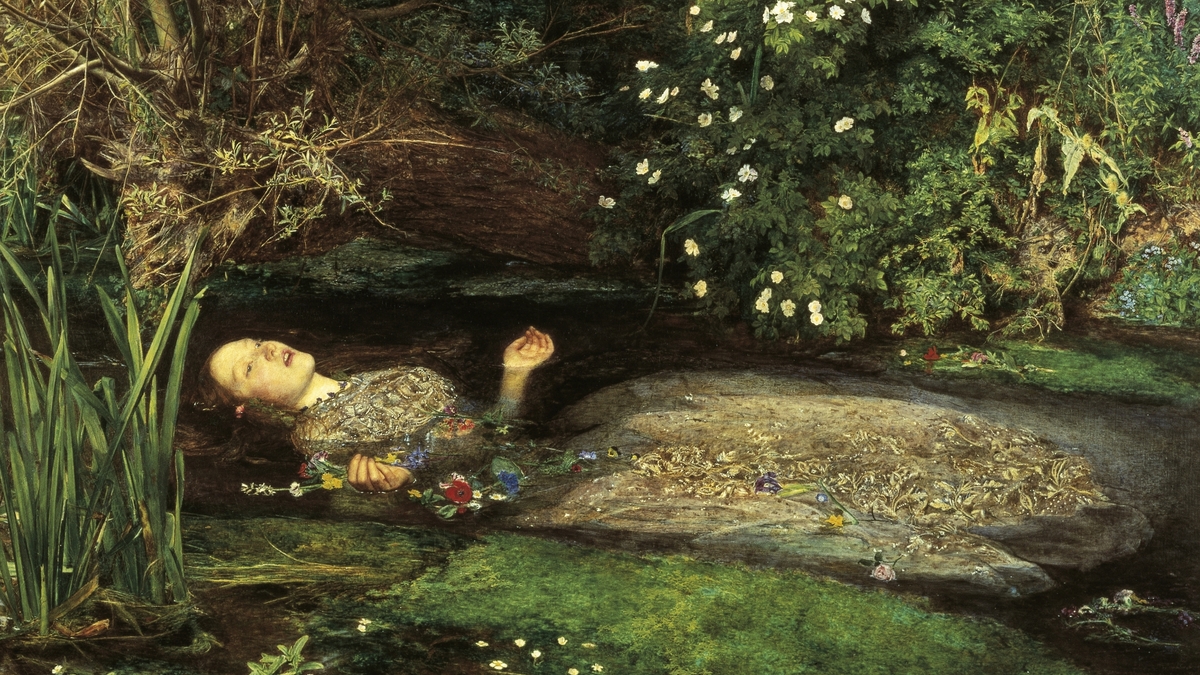
This picture reveals the portray “Ophelia,” by John Everett Millais (1829-1896). Specialists say that there is a purpose that we’re drawn to artwork and music that depict disappointment.
De Agostini through Getty Photos
cover caption
toggle caption
De Agostini through Getty Photos

This picture reveals the portray “Ophelia,” by John Everett Millais (1829-1896). Specialists say that there is a purpose that we’re drawn to artwork and music that depict disappointment.
De Agostini through Getty Photos
Composer Cliff Masterson is aware of how one can make sorrow elegant.
Take his regal, mournful adagio Lovely Unhappiness, for instance:
“After I wrote it, the sensation of the music was unhappy, however but there was this stunning melody that sat on prime,” Masterson says.
Written for a string orchestra, the piece observes the conventions of musical melancholy. Phrases are lengthy and gradual. Chords keep in a slender vary.
“Clearly, it is in a minor key,” Masterson says. “And it by no means strays removed from that minor key house place.”
The piece even includes a violin solo, the popular orchestral expression of human sorrow.
“It is one of many few devices the place I believe you will get a lot persona,” Masterson says. “The intonation is completely yours, the vibrato is completely yours.”
Lovely Unhappiness: Violin solo
But for all of those aware efforts to evoke disappointment, the piece can be designed to entice listeners, Masterson says.
It is a part of the album Hollywood Adagios, which was commissioned by Audio Community, a service that gives music to shoppers like Netflix and Pepsi.
“There’s numerous unhappy songs on the market, very unhappy music,” Masterson says. “And folks get pleasure from listening to it. They benefit from it, I believe.”
Why our brains hunt down disappointment
Mind scientists agree. MRI research have discovered that unhappy music prompts mind areas concerned in emotion, in addition to areas concerned in pleasure.
“Pleasurable disappointment is what we name it,” says Matt Sachs, an affiliate analysis scientist at Columbia College who has studied the phenomenon.
Ordinarily, folks search to keep away from disappointment, he says. “However in aesthetics and in artwork we actively search it out.”
Artists have exploited this seemingly paradoxical conduct for hundreds of years.
Within the 1800s, the poet John Keats wrote about “the story of pleasing woe.” Within the Nineteen Nineties, the singer and songwriter Tom Waits launched a compilation aptly titled “Lovely Maladies.”
There are some seemingly causes our species developed a style for pleasurable disappointment, Sachs says.
“It permits us to expertise the advantages that disappointment brings, comparable to eliciting empathy, comparable to connecting with others, comparable to purging a unfavorable emotion, with out truly having to undergo the loss that’s usually related to it,” he says.
Even vicarious disappointment could make an individual extra life like, Sachs says. And sorrowful artwork can carry solace.
“After I’m unhappy and I hearken to Elliott Smith, I really feel much less alone,” Sachs says. “I really feel like he understands what I am going by means of.”
‘It makes me really feel human’
Pleasurable disappointment seems to be most pronounced in folks with plenty of empathy, particularly a part of empathy referred to as fantasy. This refers to an individual’s capability to establish intently with fictional characters in a story.
“Despite the fact that music would not at all times have a powerful narrative or a powerful character,” Sachs says, “this class of empathy tends to be very strongly correlated with the having fun with of unhappy music.”
And in motion pictures, music can truly propel a story and tackle a persona, Masterson says.
“Composers, notably within the final 30 to 40 years, have achieved a improbable job being that unseen character in movies,” he says.
That is clearly the case within the film E.T. the Further-Terrestrial, the place director Steven Spielberg labored intently with composer John Williams.
“Even now, on the ripe outdated age I’m, I can’t watch that movie with out crying,” Masterson says. “And it is quite a bit to do with the music.”
Pleasurable disappointment is even current in comedies, just like the animated sequence South Park.
For instance, there is a scene during which the character Butters, a fourth grader, has simply been dumped by his girlfriend. The goth children attempt to console him by inviting him to “go to the graveyard and write poems about loss of life and the way pointless life is.”
Butters says, “no thanks,” and delivers a soliloquy on why he values the sorrow he is feeling.
“It makes me really feel alive, you understand. It makes me really feel human,” he says. “The one means I might really feel this unhappy now could be if I felt one thing actually good earlier than … So I suppose what I am feeling is sort of a stunning disappointment.”
Butters ends his speech by admitting: “I suppose that sounds silly.” To an artist or mind scientist, although, it may appear profound.



